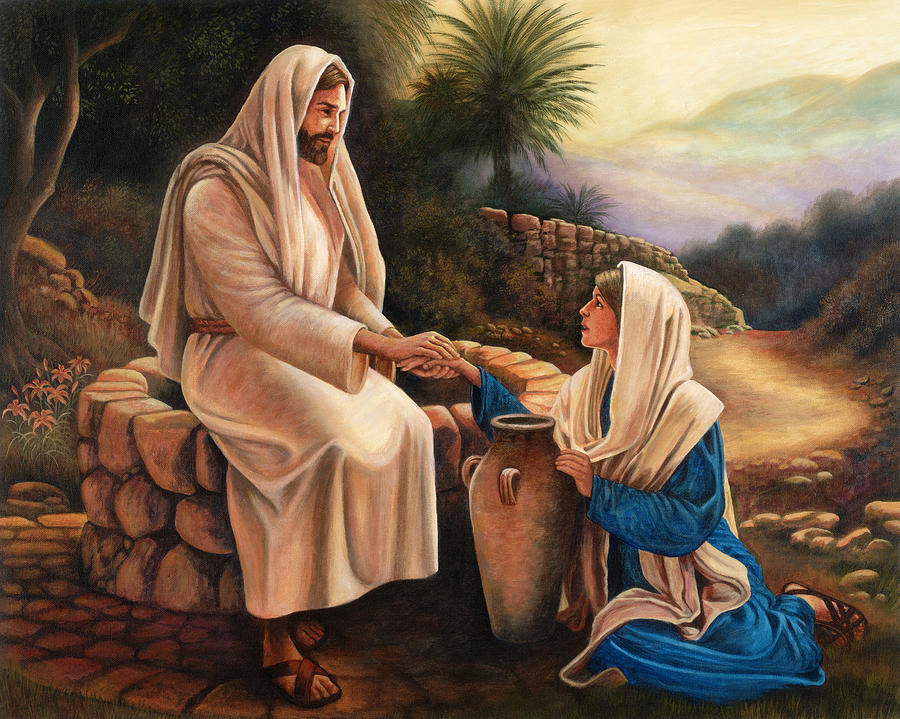
Of course, we already know him, but perhaps we have not yet met him
in person, and we have not yet recognized him as our Savior.”
Before leading the Angelus, the Pope spoke to a crowd of around 40,000 people in St. Peter’s Square about the encounter between Jesus and the Samaritan woman at the well as recounted in the fourth chapter of John.
Asking for a drink of water, Jesus, a Jew, begins a dialogue with the woman, the Pope said. She asks why he would deign to ask something of her, a Samaritan. Jesus answers her that he alone can give her “living water, water that satisfies every thirst.”
At first, she thinks it is a type of temporal water that would mean she no longer has to go to the well to draw water. “But Jesus speaks of a different water.”
We are, in some ways, like this woman, he said. “Her thirst for affection and a full life was not satisfied” by the world – in this case, by her five husbands. “We know who Jesus is, but maybe we have not met him in person, talking with him, and we have not yet recognized him as our Savior.”
“This time of Lent is a good time to approach him, meet him in prayer in a heart to heart conversation, see his face in the face of a brother or sister suffering,” Francis explained.
By approaching the Lord in prayer and strengthening our personal relationship with him, he said, “we can renew in us the grace of Baptism, quench our thirst at the source of the Word of God and his Holy Spirit; and so discover the joy of becoming artisans of reconciliation and peace tools in everyday life.”
After the Angelus, the Pope prayed for Peru, which, because of heaving rains in the last few days, has been hit by floods and mudslides, resulting in the deaths of 72 people, BBC News reports.
“I want to assure my closeness to the dear people of Peru, hit hard by devastating floods. I pray for the victims and for those engaged in relief operations,” he said.
The worst floods the country has seen in 30 years, the capital city of Lima has been without water since Monday, services only now being restored, and more than 800 towns and cities have declared a state of emergency, according to BBC News.
Pope Francis also drew attention to the beatification Saturday of Blessed Josef Mayr-Nusser in Bolzano, Italy, who was martyred for his refusal to join the Nazis in faithfulness to the Gospel.
“For his great moral and spiritual stature, he is a model for the lay faithful, especially for dads,” Francis said, “that today we remember with great affection, though the liturgical feast of St. Joseph, their patron.”
Because March 19 is the feast of St. Joseph – also Father’s Day in Italy – Pope Francis concluded with a special greeting for all fathers, asking for a round of applause from the crowd.
....
Taken from: http://www.catholicnewsagency.com/news/pope-francis-this-lent-seek-the-only-well-that-satisfies-christ-25963/
Before leading the Angelus, the Pope spoke to a crowd of around 40,000 people in St. Peter’s Square about the encounter between Jesus and the Samaritan woman at the well as recounted in the fourth chapter of John.
Asking for a drink of water, Jesus, a Jew, begins a dialogue with the woman, the Pope said. She asks why he would deign to ask something of her, a Samaritan. Jesus answers her that he alone can give her “living water, water that satisfies every thirst.”
At first, she thinks it is a type of temporal water that would mean she no longer has to go to the well to draw water. “But Jesus speaks of a different water.”
We are, in some ways, like this woman, he said. “Her thirst for affection and a full life was not satisfied” by the world – in this case, by her five husbands. “We know who Jesus is, but maybe we have not met him in person, talking with him, and we have not yet recognized him as our Savior.”
“This time of Lent is a good time to approach him, meet him in prayer in a heart to heart conversation, see his face in the face of a brother or sister suffering,” Francis explained.
By approaching the Lord in prayer and strengthening our personal relationship with him, he said, “we can renew in us the grace of Baptism, quench our thirst at the source of the Word of God and his Holy Spirit; and so discover the joy of becoming artisans of reconciliation and peace tools in everyday life.”
After the Angelus, the Pope prayed for Peru, which, because of heaving rains in the last few days, has been hit by floods and mudslides, resulting in the deaths of 72 people, BBC News reports.
“I want to assure my closeness to the dear people of Peru, hit hard by devastating floods. I pray for the victims and for those engaged in relief operations,” he said.
The worst floods the country has seen in 30 years, the capital city of Lima has been without water since Monday, services only now being restored, and more than 800 towns and cities have declared a state of emergency, according to BBC News.
Pope Francis also drew attention to the beatification Saturday of Blessed Josef Mayr-Nusser in Bolzano, Italy, who was martyred for his refusal to join the Nazis in faithfulness to the Gospel.
“For his great moral and spiritual stature, he is a model for the lay faithful, especially for dads,” Francis said, “that today we remember with great affection, though the liturgical feast of St. Joseph, their patron.”
Because March 19 is the feast of St. Joseph – also Father’s Day in Italy – Pope Francis concluded with a special greeting for all fathers, asking for a round of applause from the crowd.
....
Taken from: http://www.catholicnewsagency.com/news/pope-francis-this-lent-seek-the-only-well-that-satisfies-christ-25963/
